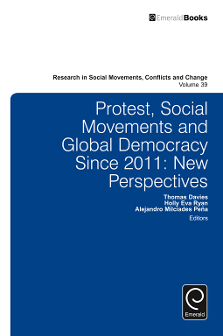
Foreword
Protest, Social Movements and Global Democracy Since 2011: New Perspectives
ISBN: 978-1-78635-028-2, eISBN: 978-1-78635-027-5
ISSN: 0163-786X
Publication date: 9 June 2016
Citation
(2016), "Foreword", Coy, P.G. (Ed.) Protest, Social Movements and Global Democracy Since 2011: New Perspectives (Research in Social Movements, Conflicts and Change, Vol. 39), Emerald Group Publishing Limited, Leeds, p. ix. https://doi.org/10.1108/S0163-786X20160000039016
Publisher
:Emerald Group Publishing Limited
Copyright © 2016 Emerald Group Publishing Limited
In Tunisia in December 2010, a 26-year-old college graduate named Mohamed Bouazizi was selling fruits and vegetables on the street because he simply had no other employment options. He also had no vendor’s license. When his meager stock was confiscated by the police, he protested by setting himself afire. Bouazizi likely had no inkling of the firestorm of protest his desperately courageous act of self-immolation would help ignite across the region, and beyond.
Although too much has probably been made of Tunisia and the Bouazizi spark, it nonetheless serves as a useful starting point for examining the widespread, noteworthy, and fast-developing political protests and social movements that emerged globally since 2011. The result is that scholars have struggled to catch up and to make sense of this global protest wave, sometimes making overly generalized claims with regard to its novelty, its meanings, and its significance that are hard to substantiate when individual cases are subjected to careful inspection, as the contributors to this volume do so wonderfully.
Volume editors Thomas Davies, Holly Eva Ryan, and Alejandro Milcíades Peña mounted an international workshop in London in June 2015 to sort out the meanings of these post-2011 developments. Showcasing the very best of the research presented in London, this volume of the Research in Social Movements, Conflicts and Change series is the welcome fruit of that conference. The erudite introduction by the editors is itself an important interpretive contribution and a much-needed corrective to some of the early and not fully developed interpretations of this groundswell of grassroots democratic action. And the collection of peer-reviewed papers that follow are nothing short of a benchmark; it is the moment when astute and careful scholarly analysis – particularly attuned to the localized politics of context – finally caught up to the global wave of protest.
- Protest, Social Movements and Global Democracy since 2011: New Perspectives
- Research in Social Movements, Conflicts and Change
- Protest, Social Movements and Global Democracy Since 2011: New Perspectives
- Copyright Page
- List of Contributors
- Foreword
- Protest, Social Movements and Global Democracy since 2011: New Perspectives
- Do Issues Matter? Anti-Austerity Protests’ Composition, Values, and Action Repertoires Compared
- Occupying Organization: Space as Organizational Resource in Occupy Wall Street
- Protest and Recognition in the Bulgarian Summer 2013 Movement
- Challenging the Gospel of Neoliberalism? Civil Society Opposition to Mining in Armenia
- Transnational Resistance Networks: New Democratic Prospects? The Lyon-Turin Railway and No TAV Movement
- When Social Movements Become a Democratizing Force: The Political Impact of the Student Movement in Chile
- Religion and Political Activism in Post-Revolutionary Tunisia
- Anarchy or Utopia? Turkish Media Representation of the Gezi Park Protests
- Saudi Intervention, Sectarianism, and De-Democratization in Bahrain’s Uprising